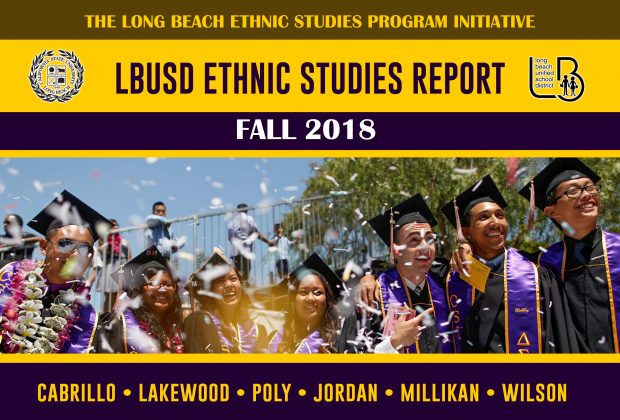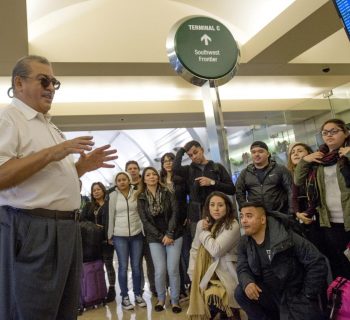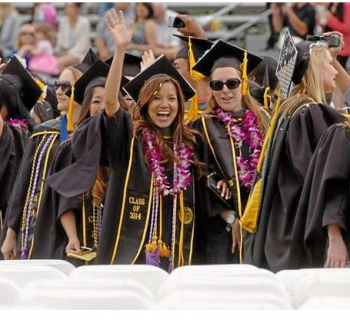By: CHRISTOPHER LUND, ED.D., JODI G. FENDER, PH.D.
Office of Research, Planning, Evaluation & School Improvement, Long Beach Unified School District (LBUSD)
Abstract
Ethnic Studies has been offered to LBUSD students for three academic years, beginning in Fall 2015. Students primarily enrolled in the foundational course: 215, US Diversity and the Ethnic Experience, accounting for 90% of all Ethnic Studies enrollment (n=1063) and performed well with 70% earning As or Bs. Generally, students who have taken Ethnic Studies perform at higher levels than students who did not choose to enroll in Ethnic Studies with significant differences observed for GPA, SBAC, On-track status for Graduation and A-G, number of AP courses taken and Social-Emotional Learning measures. Ethnic Studies students (n=295) completed course surveys and 50-60% of students reported the course to be of the same level of difficulty as other courses. However, students did report the course readings to be difficult and had the lowest agreement ratings for “being prepared for each class session.” Students with lower GPAs have enrolled in the courses and performed well, and over one-quarter of students in the most recent academic year report post-high school plans of 2-year college or non-college plans, indicating that these courses are reaching a diverse group of students. Student feedback revealed an appreciation of many aspects of the course including learning about other students’ background, the types of student interaction the course afforded, and the opportunity to earn college credits.
The Development and History of Ethnic Studies Program at LBUSD The Long Beach Ethnic Studies program launched in the Fall Semester of 2015 and offers LBUSD High School students the unique opportunity to take free college credit Ethnic Studies classes at LBUSD High Schools. The district is proud to collaborate with Cal State Long Beach in offering free dual enrollment Ethnic Studies Courses to Long Beach Unified students in grades 11-12 in the fall and grades 10-12 in the spring. Students who successfully complete courses earn both Long Beach Unified and CSULB credit toward graduation. The Superintendent made a $1.2 million commitment to offer 12 classes per semester for 5 years. Between May and September, four ethnic studies departments in the College of Liberal Arts became involved. Launched through the CSULB campus’ college of Continuing and Professional Education, courses take place on Saturday mornings at six comprehensive high schools: Cabrillo, Jordan, Lakewood, Millikan, Poly and Wilson. For the start of the program, close to 2000 parents and students attended an orientation resulting in 420 enrollments. There were 750 registered interested and 300 students went onto a waiting list. Subsequently, there was increased funding for up to 16 classes per semester. The foundation/cornerstone course is US Diversity and the Ethnic Experience providing a uniform syllabus and reader and an overview of four ethnic groups. This primary course is a survey of four major ethnic groups (Native American, African American, Chicano/Latino American and Asian American) from the earliest periods of Native American history, through migrations to the Americas, into the present conditions of U.S. society. Special attention is given to the formation and transformation of each ethnic group and their individual and collective roles in the development of the United States. Additional classes are available for students that complete the primary course and wish to gain deeper knowledge in the specified content areas.
Ethnic Studies Course Enrollment
LBUSD students have been enrolling in CSULB Ethnic Studies courses since in Fall 2015. In this report, presented is an analysis of data from 950 students who had enrolled in one Ethnic Studies course and 52 have enrolled in two or more Ethnic Studies courses, with a comparison group of other high school students districtwide. The majority of Ethnic Studies students were not GATE identified (81%) and were low SES (72%). However, few special education students enrolled in the course, just 3% (32) of students were RSP. Enrollment in the course by Ethnicity was similar to general district enrollment in our file for analysis. We analyzed the ethnicities of students enrolled in high school in LBUSD as compared with students enrolling in the Ethnic Studies course. As shown in Figure 1, the enrollment in Ethnic Studies courses exceeded district enrollment for Hispanic students (62% vs 54%) and slightly exceeded for African American/Black students (16% vs 15%). White students enrolled in Ethnic Studies at a rate less than overall district enrollment (9% vs 15%). The remaining ethnicities enrolled in Ethnic Studies courses at or below their rate of enrollment overall in the district.








